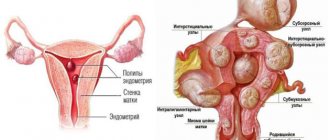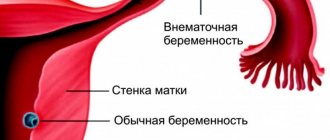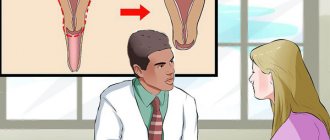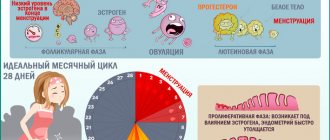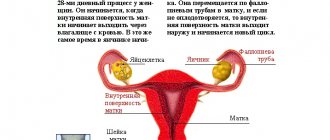Menstruation is an important part of female nature. Their onset coincides with adolescence (11–13 years) and determines the body’s readiness to conceive a child. Every month, the uterus prepares for fertilization by forming a new mucous membrane. If the process of conception does not occur, the body is cleared of this layer. The uterus begins to bleed, bringing the lining out. This usually takes 5–7 days. It all depends on physiological characteristics. There are women who always have their periods for 3 days.
Pathology or normal?
The appearance of menstruation and the formation of their duration have characteristic forms. Any deviation from the rules, in particular the short period during which menstruation occurs, may be the result of various reasons:
- External circumstances (surgical interventions, infectious diseases, internal injuries of various types).
- Changes within the body (hormonal, psychosomatic, physiological).
Short-term critical days are usually characterized by small blood loss, only 50–60 ml per day. They last no more than 2 days. Experts gave a name to this process - oligomenorrhea, attributing it to an anomaly of the menstrual cycle.
When your period regularly lasts 3 days, this is normal. If the critical days first lasted 5 or 6 days, and then their duration was reduced to three, such a situation may not cause concern only in the following cases:
- First year of the menstrual cycle.
- Several years before the onset of menopause.
A short-term deviation from the cycle can occur in any woman. This is the result of constant changes in hormonal and emotional background. If you notice that during a certain period your period did not last for a week, as usual, and then everything was restored, this should not cause much concern.
How long should periods last: normal
The duration of the menstrual cycle is an individual concept; it can be 21 or maybe 32 days.
Do not confuse the length of your cycle with the length of your period. The menstrual cycle is the period of time from the first day of menstruation until the beginning of the next one.
Of course, any deviations in the cycle should alert you and sow doubts. Especially when a woman is of reproductive age and her cycle is irregular. At the same time, menstrual flow (period) lasts only 2 days.
It is considered normal when menstruation lasts from 3 to 7 days. But it also happens that menstruation lasts only 2, sometimes 3-4 days, and this, of course, must be explained.
Shortened monthly variants of the norm:
- In teenagers . If such jumps in the duration of menstruation occur in teenage girls who are in puberty, this is normal. The discharge may last for 3-4 days, but within a year the cycle should form and return to normal. If this does not happen, you need to visit a gynecologist. In order to monitor the beginning, duration of the cycle and critical days, even in adolescence it is recommended to keep a calendar in order to immediately identify deviations.
The average discharge lasts 4–5 days, so if the duration is too short (less than 2 days) or long (more than 7–10 days), this is a good reason to visit a gynecologist.
At the same time, menstruation lasting 3 days is not considered a pathology. It all depends on the characteristics of the female body and the functioning of the reproductive system.
Normal menstruation
One of the main conditions for the proper flow of menstruation is sufficient blood supply and healthy cell tone of the female genital organs. Normally it should look like this:
- The volume of discharge on the first day of menstruation is quite abundant, often with clots. Every day it gets smaller. On days 4–7, menstruation subsides.
- Critical days begin with dark smudges, then on days 2–3 they become more abundant.
- The amount of bleeding during menstruation often changes. At first they came abundantly, then their number decreased until it became a smear. On day 4 the amount of bleeding returns, and on days 6–7 everything ends.
Such indicators are the norm. The same cycle applies to menstruation, which lasted only 3 days instead of a week. Everything takes place in the same sequence, but physiological changes in a woman’s body do not occur within a few days, but after a certain number of hours within one day.
If there is a failure
Quite often, women, noticing disruptions in their cycle, mistakenly believe that the cause is the characteristics of the body. They do not keep track of how many days their periods have passed, try not to notice the pulling sensations in the lower abdomen and lower back and/or drown out the pain with antispasmodics, consider malaise, headache and nausea to be the consequences of fatigue.
However, these symptoms are an important reason to visit a doctor. It is especially important to contact a specialist if your period lasts for 5–7 days for a long time, and then its duration is reduced to 3, less often 2 days.
Women naturally have good health, but the reality of life is that drug abuse and frequent stressful situations have a very negative impact on the condition and functioning of the body. There are also more dangerous problems with menstrual irregularities:
If you notice serious and frequent irregularities in the menstrual cycle, in order not to complicate the situation, you should consult a doctor as soon as possible. You need to tell him in detail how many, how and when your period was.
Why does your period last 2 days: reasons
When a woman discovers that her period is 2 days old, she should start looking for reasons immediately; it is recommended to immediately consult a doctor. The duration of menstrual bleeding varies from woman to woman, but there are certain norms.
Normal menstrual bleeding
The duration of the menstrual cycle is 21-35 days. Experts distinguish several phases of the cycle, the first of which is the follicular or menstrual phase. During this period, the rejection of the endometrium, the mucous layer of the uterus, begins, manifested by menstrual bleeding.
The follicular phase lasts from one week to 22 days (on average it lasts 2 weeks). Menstruation begins on the first day of this phase, and its normal duration is from 3 to 7 days. During menstruation, 50 to 80 ml of menstrual bloody fluid is released. Thus, if menstruation is characterized by short duration (less than 3 days) and scanty discharge (less than 30 ml), we can talk about oligomenorrhea.
What causes menstruation to shorten?
Both physiological and pathological oligomenorrhea can be distinguished. In the first case, short periods are a completely natural phenomenon, and in the second they can be considered a sign of some kind of disorder.
Physiological oligomenorrhea is observed in girls in adolescence after the onset of menarche - the first monthly bleeding. Menstrual function is established throughout the year, so at this time the cycle has a different duration, menstruation occurs irregularly, often they are not only scanty, but also end early, already 1-2 days after the onset.
Another variant of physiological oligomenorrhea is a shortening of menstruation due to the onset of perimenopause. This period lasts about two years
Source
How to restore the length of your periods?
In order for menstruation to proceed normally, as well as to correct and restore its duration, it is necessary to first cure all present gynecological diseases that caused this syndrome. Infectious and inflammatory processes are treated with antibiotics in combination with physiotherapy.
The following will help to strengthen the body weakened after such treatment:
- Physical education and sports classes.
- Prolonged stay in the fresh air.
- Proper nutrition.
- Taking vitamin complexes.
Increased attention should be paid to the normal daily routine, work and rest schedule. Women need to know that regular lack of sleep, numerous stresses, large amounts of coffee consumed, smoking, and alcohol disrupt the normal cycle and also increase pain during menstruation.
Herbal medicines and traditional methods significantly increase the possibilities of normalizing menstruation. In some cases, they become a worthy alternative instead of using hormonal drugs. Herbal medicines are milder in their action, safer and can be purchased without a special prescription.
If you are worried that your period initially came and continues to last only 3 days, this is absolutely normal. But when, for one reason or another, a malfunction occurs in the body and the number of days of the menstrual cycle changes, you need to pay close attention to this and take action. Namely, visit a gynecologist and get advice, adequate and correct treatment.
Menstruation is considered a natural physiological process that every woman of reproductive age experiences every month. The duration of critical days is different for all representatives of the fair sex. The nature of the discharge also differs. In some cases, a period of 3 days is normal, but sometimes such a short period is a symptom of pathology.
Why are my periods so short to begin with?
Girls usually get their first period at the age of 12–15 years. During this period, hormonal changes begin, due to the process of ovarian maturation. This explains why menstruation began and immediately disappeared for several months. This phenomenon is not uncommon.
It takes up to two years to establish a cycle. Both the interval between menstruation and their volume may change. Scanty and heavy discharge during this period does not cause concern.
The duration of menstruation before the cycle is finally established can be different, fluctuate constantly, but gradually returns to normal. Therefore, it is very important to correctly calculate the cycle duration.
If any deviations appear, there is no need to panic. With changes such as long or short periods, the reasons may be different. Overwork, a strict diet, physical or emotional stress, and even a change of environment can affect the duration of the menstrual phase. As soon as the factor causing the failure is eliminated, the cycle will be restored.
If your period lasts 3 days from the very beginning and there is no severe pain or other unpleasant symptoms during menstruation, then this can be considered a normal condition.
In case of regular violations and pronounced pain syndrome, a medical consultation is needed. It is quite possible that menstruation lasts for three days due to the development of pathologies of the genitourinary system. You should definitely consult a doctor if your period lasts 1-2 days and ends.
Oligomenorrhea
Oligomenorrhea is short periods, lasting only 1-2 days. This phenomenon is caused by physiological and pathological reasons.
In medicine, there are two groups of oligomenorrhea: primary and secondary. If menstruation lasts 2 days from the very beginning, then we are talking about the first form. The second manifests itself in reproductive age, when short periods suddenly appear instead of long periods.
In any case, this phenomenon cannot be ignored. Only a doctor can tell you whether menstruation lasts 1 day or 2 and is considered normal, and only after a diagnosis. Short critical days often signal problems in the body. That's why it's so important to find out why your period ended earlier than usual. The reasons are not always harmless.
Primary oligomenorrhea
Very scanty and short periods after the onset of menarche are observed quite often. Only after a couple of years the cycle is established. However, it is recommended to be examined by a gynecologist and make sure that this phenomenon is considered physiological and there is no reason for medical correction.
Primary oligomenorrhea is a term used in gynecology when menstruation lasts 1-2 days from the very beginning. This phenomenon may be due to the following reasons:
- hormone imbalance;
- exposure to stress;
- unfavorable environmental situation;
- pathologies of intrauterine development;
- dysfunction of the ovaries;
- being underweight or obese;
- anemia;
- inflammatory or chronic diseases;
- oncological diseases.
Secondary oligomenorrhea
In cases where previously the duration of critical days was within normal limits and menstruation suddenly decreased, we are talking about secondary oligomenorrhea. This phenomenon needs to be taken seriously. In this case, you need to conduct a full examination. The reasons why menstruation may be reduced are often serious illnesses. Physiological factors can also influence the duration of the cycle.
Causes of a short menstrual cycle
The pituitary gland and ovaries are responsible for the formation of the menstrual cycle. In situations where, instead of 5 days, menstruation lasted 3 days, functional disorders cannot be ruled out. Physiological deviations from the norm are observed with repeated abortive measures and curettage. Similar cycle disturbances are observed in women who have had tuberculosis. At the same time, such changes are possible when, instead of the usual 5 days, menstruation is reduced to 3 days.
The reasons why menstruation began to last only three days and ended earlier than usual may be poor circulation in the uterus and insufficient levels of hormones.
The course of menstruation and its duration are influenced by the following factors:
- sudden weight loss;
- vitamin deficiency or anemia;
- diseases of the genital organs;
- metabolic disorder;
- mental illness;
- emotional stress;
- surgical intervention in the organs of the genitourinary system;
- pathologies of the endocrine system;
- taking hormonal medications;
- damage to the pelvic organs;
- lactation period;
- intoxication of the body;
- infectious diseases.
A decrease in the duration of menstruation to three days does not always signal serious problems in the body, but sometimes indicates the development of a number of pathologies. Therefore, such changes should not be ignored. Only after a comprehensive examination will it be possible to identify the cause of short periods and restore the previous cycle. Self-medication in this case is unacceptable. Only a gynecologist can prescribe an adequate course of therapy.
If your period lasts for one day
One of the frequent indicators of oligomenorrhea in combination with hypomeroea are precedents when menstruation just began and immediately ended. The discharge has a smearing consistency, it may be a couple of drops of blood. Such critical days begin ahead of schedule. When a cycle failure occurred once and did not occur again, there is no need to panic. You need to go to the doctor in a situation if the hitches recur for 3 months or more. Such a failure is also non-pathological during puberty. During the first 2 years, the menstrual cycle is adjusted and any changes in the quality and quantity of discharge are possible.
The menstrual cycle is negatively affected by excessive physiological stress and stressful situations.
Carrying out operations or taking hormonal medications can also cause a reduction in critical days, as well as stop them completely. Menstruation that anointed one day and then ended signals the presence of one of the diseases:
- diabetes;
- neoplasms in the pelvic area;
- polycystic disease;
- ovarian dysfunction;
- liver and kidney diseases;
- Koch's wand.
A common reason why periods lasted 1 day and ended early could be pregnancy. Such spotting has a nature different from menstruation. Blood is released as a result of the engraftment of the embryo, and not due to rejection of the epidermis.
Girls whose periods for the first time lasted only 1 day and ended immediately are recommended to visit a doctor. You can take a pregnancy test at home.
If there are primary signs of menstrual imbalance, you should contact an antenatal clinic. After conducting the necessary tests, gynecologists explain why menstruation lasts only one day and what this means for the reproductive system, as well as why it is necessary to control the duration of menstruation.
Your period lasted 3 days instead of 6: the main reasons
A stable menstrual cycle is the main indicator of a woman’s physical and mental health. Even deviations not related to reproductive function can affect the course of the cycle. The situation when there is a sudden reduction in menstruation, previously they lasted six days, and then they began to last three, causes fear and anxiety.
The regularity of the cycle depends on the woman’s health
What is a normal menstrual cycle like?
The establishment of regularity of menstruation occurs almost within a year after the first bleeding. The concept of a “normal cycle” has a broad scope and its own characteristics for each woman. The full cycle of development, maturation and release of the egg lasts 21–35 days, after which, in the absence of fertilization, the process of rejection of the endometrial mucosa begins and spotting appears. This period also has a considerable range, 3–7 days. The regularity of menstruation is established at puberty and changes only during pregnancy or pathological abnormalities. At different stages of the cycle, different hormones prevail; their balance in the body is maintained by the female endocrine system. Thus, a disruption in the monthly cycle can be either a consequence of minor deviations in lifestyle or evidence of serious violations.
Normal cycle length varies from person to person.
How many days should menstruation last normally?
The norm in gynecology is considered to be the duration of menstruation from 3 to 8 days, and about 50–80 ml of blood should be released. Deviations occur at the stage of formation of the menstrual cycle. In addition, if your period ends on the second day, this may indicate the presence of menopause. You can learn more about this from the video:
If your period lasts 2 days - is it normal or not?
Most cases where periods have become short compared to previous menstrual cycles are associated with childbirth or surgical interventions in the woman’s reproductive system. It is possible to say that menstruation for two days is considered normal only after a complete examination and oral questioning of the patient.
For some women, two days of menstrual flow is considered normal if:
- they have this duration every month since the onset of menarche;
- they have been going on for the last few years, and nothing bothers the patient and the tests are normal.
In other cases, if your period lasted 2 days and ended, then the situation must be considered from a pathological point of view. The patient undergoes all the necessary examinations, after which the doctor prescribes adequate treatment.
Can periods last 3 days?
An indicator of three days for bleeding is considered normal. In medicine, this is a kind of limit for counting menstruation in the monthly cycle. Only a certain part of women in the world can boast of short periods, because for most girls, menstruation lasts 5–6 days.
Comment! If previously your periods lasted 4–7 days, but recently the discharge has become short and characterized by a duration of 3 days, it is worth visiting a gynecologist.
A period of 3 days is normal if, according to the female calendar, such a duration is observed constantly. If your period lasts 3 days instead of 5 days, then you should pay attention to the following health factors:
- check the genitourinary system;
- monitor body temperature;
- monitor symptoms of premenstrual syndrome;
- check the level of hormones in the blood.
If a woman leads a sedentary lifestyle, her diet is poor, and stress has become frequent, you shouldn’t be surprised, these will be the reasons for short periods of 3 days.
Can periods last 4 days?
If your period lasts 4 days, this figure can be considered normal. This duration cannot be called short, because 4 days are included in the norm of bleeding established by gynecologists.
Warning! Menarche during adolescence can last from 2 to 8 days, and the amount of discharge can vary. You should not worry if your period lasted 4 days, and then came only after 2 months - this indicates the establishment of the menstrual cycle.
Four-day periods are considered normal, so there is no reason to panic if menstruation is not accompanied by severe discomfort and pain. You should be concerned when the previous menstruation lasted more or less than 4 days - then you should visit a doctor.
The establishment of regularity of menstruation occurs almost within a year after the first bleeding. The concept of a “normal cycle” has a broad scope and its own characteristics for each woman. The full cycle of development, maturation and release of the egg lasts 21–35 days, after which, in the absence of fertilization, the process of rejection of the endometrial mucosa begins and spotting appears. This period also has a considerable range, 3–7 days. The regularity of menstruation is established at puberty and changes only during pregnancy or pathological abnormalities. At different stages of the cycle, different hormones prevail; their balance in the body is maintained by the female endocrine system. Thus, a disruption in the monthly cycle can be either a consequence of minor deviations in lifestyle or evidence of serious violations.
Normal cycle length varies from person to person.
Causes of changes not caused by pathological processes
Shortening your periods is always accompanied by a decrease in blood loss, and this is far from a favorable fact. Often a woman feels nagging pain, nausea, fatigue, and frequent nosebleeds. The situation when menstruation lasts for three to six days from the very beginning, then their sharp reduction occurs, can be caused by many reasons not related to the pathology of the female genital area:
- The postpartum period, bringing the hormonal system to its previous state, takes some time and usually lasts for several months.
- Artificial termination of pregnancy is a huge shock to the female reproductive system. Any invasion of the genital area (abortion, surgery) disrupts the hormonal balance. When answering the question why menstruation lasts much less, three days instead of the previous six, it is important to pay attention to the nature of the discharge and general well-being. Dark clots with an unpleasant odor, increased temperature and weakness indicate a poorly performed operation that caused an inflammatory process.
- Taking hormonal contraceptives that do not correspond to a woman’s natural cycle. In general, long-term use of contraceptives can disrupt the rhythm of menstruation.
- Oddly enough, nutrition and excess weight can also influence the duration of “critical days”, which in case of obesity can last for 1-2 days in the form of spotting, or can be marked by hypermenorrhea. Strict diets and sudden weight loss negatively affect the course of the cycle; menstruation, which lasted for the prescribed amount of time, gradually decreases and may stop altogether.
- A sedentary lifestyle, lack of blood circulation in the genitals, and, accordingly, a lack of oxygen and nutrients, lead to a reduction in menstruation.
- Stress or prolonged nervous tension negatively affects the regulation of menstrual function.
- Another factor influencing the length of the cycle is thyroid dysfunction. There seems to be no connection, but women suffering from decreased production of thyroid hormones experience a shortening of the cycle and duration of menstruation.
When to worry
Causes due to pathological changes and processes in the female reproductive system:
- A sudden reduction in menstruation that has lasted at least three days is a cause for concern. Inflammatory diseases of the genitourinary area can manifest themselves in this way. If it is infectious, other signs may appear: nagging pain in the lower abdomen; burning, severe itching of the genitals; unusual discharge; temperature rise is possible. Chronic sluggish inflammation of the adnexal organs leads to the occurrence of adhesions, both in the abdominal cavity and in the lumen of the tubes. This can lead to the fact that the menstrual cycle is shortened, and the periods themselves last less than three days.
- Benign neoplasms. More often, a shortening of the cycle and a shortening of the number of days of menstruation is caused by the occurrence of an ovarian cyst. Follicular cysts are formations that occur in women of reproductive age; they rarely have severe symptoms and never degenerate. Equally often detected, endometriosis and fibroids lead to periods that are frequent and abundant, accompanied by the release of dark-colored clots. At the same time, a decrease in blood pressure and first-degree anemia are observed.
- Hormonal imbalance and a reduction in “critical days” are not a deviation from the norm during the formation of menstruation and as menopause approaches. In adolescence, individual inconsistencies in the regime are possible; menstruation, which lasted three days in the previous month, may last only two in the present month, and five in the subsequent month. Such “swings” are a completely natural phenomenon for the puberty period.
The menopausal period is characterized by a gradual decline in reproductive function and a decrease in hormone production. Menstruation occurs less frequently, often limited to just smears. Such physiological changes occur after approximately 45–50 years and should not be scary, since they are a pattern.
Follicular cysts have the ability to change the monthly cycle. On the left in the picture is a normal ovary, on the right - with a follicular cyst
Menarche and anticipation of menopause
The first menstruation usually occurs at 12-15 years of age. It is clear that a girl at this age is still growing; all systems, including the reproductive one, are in the process of formation. In order for everything to go as nature intended, it is important not to interfere with the process. And this can be done by psychological shocks, without which life cannot do, or by illness.
But even if everything is smooth in this sense, the ratio of hormones that ensure the smoothness of the menstrual cycle is uneven in each month. Therefore, sometimes you should not be surprised that your periods are intermittent. Moreover, if this was preceded by:
- Stress;
- Heavy physical activity;
- Diets that teenage girls love to test their bodies;
- Infection followed by treatment with antibacterial drugs.
In addition, the volume of menstruation for most of them is very small, which can be perceived by the girl as breaks between discharges. If this is an isolated case, the next cycle evens out and does not frighten the teenager with such oddities, you can be sure that everything is fine. Repeating this from month to month is not the norm. The girl must be examined for gynecological diseases, hormonal disorders, brain tumors, and congenital defects.
This can also be detected by a woman aged 45-50 years, who has already experienced childbirth, possibly abortions and gynecological diseases. But in this case, what caused the pause during menstruation has a different explanation. The ovaries, which are directly involved in the menstrual process, no longer work as intensively as before. The amount and ratio of hormones also changes. Therefore, as an isolated case, the cessation of menstruation and then its resumption can be considered a relative norm. It’s a different matter if this becomes a regular characteristic of menstruation and is complemented by other signs that are unusual for them. This could be a disease from the field of gynecology, endocrinology, even oncology.
How to proceed
If menstruation was previously normal and lasted 5–6 days, and then suddenly decreased to 2–3 days, you should definitely seek medical advice. It is important to establish the cause of deviations in time and prescribe the correct treatment. To do this, a survey of the patient, a comprehensive gynecological examination, and instrumental research methods are carried out.
Treatment is prescribed depending on the detected cause:
- In case of hormonal imbalance, appropriate hormone therapy and vitamin therapy are selected.
- If benign formations are detected, conservative treatment is carried out, and if there is no effect, surgical treatment is carried out. According to indications, laparoscopy or abdominal surgery is used.
- Infectious diseases are treated under the supervision of a gynecologist using general and local drugs.
- In case of endocrine abnormalities, treatment is carried out by an endocrinologist, replacement therapy and control over the functioning of the thyroid gland are prescribed. An important role is played by normalization of nutrition, the intake of a balanced amount of vitamins and microelements.
- Auxiliary methods include physiotherapy, acupuncture, aqua aerobics, massage, and gymnastics.
An episodic reduction in the number of menstrual days to three, in the absence of other unpleasant symptoms, is not a pathology and may be a consequence of an unhealthy lifestyle.
If the shortening of menstruation occurs gradually to 1–2 days, this is a reason to seek medical advice. A sharp decrease in menstrual days to two should cause concern and an immediate trip to the hospital.
We recommend reading about this topic
Why periods don’t end for a long time: main reasons
Causes of brown spotting instead of menstruation
Popular articles in the “Menstruations” section
- Why did my period start 14 days after the previous one?
- Causes, symptoms and treatment of weak periods (hypomenorrhea)
- How to reduce bleeding during menstruation?
- The main reasons for scanty periods when taking birth control pills
- Early miscarriage, how to distinguish it from menstruation?
- Reasons why periods last 2 days
- What needs to be done to speed up the monthly process
Subscribe Stay up to date with new products on our site
(c) 2020 Women's diseases
Copying materials is permitted only with an active link to the source
Questions and suggestions
Consultation with a doctor on the use of any drugs and procedures posted on the site is mandatory.
My period lasted 2 days, is pregnancy possible?
Question: Instead of the usual 6 days, my period lasted only 2, or rather one and a half days. Why could this be pregnancy or illness?
2011-09-12 06-15 | Author: Zara Margarita 17:30
it could be from anything!! but if your pregnancy is, in principle, possible (that is, you had UNPROTECTED sex before!), then maybe it’s because of pregnancy then! but in any case, you can take a test or go see a gynecologist to know for sure and not guess until your next period!!
As a result of all these changes, the uterus also begins to work in a new way: now it has the task of protecting the unborn child. In the uterus, the processes of growth and rejection of the endometrium, which are responsible for the onset of menstruation in each month, stop. The menstrual cycle stops and menstruation does not occur.
As mentioned above, pregnant women cannot menstruate. But instead of them, bloody vaginal discharge may appear, reminiscent of menstruation. Such discharge can be as heavy as menstruation and last for the same number of days, which can mislead you. About one in four pregnant women may experience spotting in early pregnancy.
The difficulty is that spotting can occur on the same days as your period, it can be the same as your period, and even last the same number of days as your period. Therefore, if you have had unprotected sexual intercourse, or errors in taking birth control pills, then the arrival of your period on the scheduled days is not a guarantee that you are not pregnant. In any case, you need to take a pregnancy test.
Causes of scanty menstruation - menstruation lasts 3 days
Menstruation is the loss of uterine tissue approximately once a month, which consists of blood, mucus from the glands of the uterus and vagina, dead cells of the lining layer of the uterus and various bacteria.
Normal menstruation is considered to be menstruation when the female body loses an average of 30 to 50 ml of blood. Normally, discharge ranges from 50 to 150 ml due to rejection of the mucous membrane. Bleeding during menstruation lasts on average 5 days; periods that are too short or too long are a reason to contact a gynecologist, while a period lasting 3 days is still considered normal.
Scanty menstruation - types of deviations
Hypomenstrual syndrome is any disorder of the menstrual cycle that is accompanied by weakening of menstruation. Among the varieties of hypomenstrual syndrome are:
- hypomenorrhea - the amount of blood released is less than 25 ml;
- oligomenorrhea - menstruation for 3 days or less;
- opsomenorea - extended menstrual interval up to 5-8 weeks;
- spaniomenorrhea - very infrequent periods up to 4 times a year.
When menstruation is scanty, the blood is very light or very dark, the menstrual cycle itself is often normal, however, the duration of menstruation is 3 days, when in previous cycles they lasted, for example, 6 days, this may be a cause for concern and a reason to consult a doctor.
A scanty period of 3 days should not become a cause for concern in young girls when the cycle has not yet established itself. Women aged 40-50 years with scanty menstruation should pay attention to the fact that this is the first sign of menopause. And women aged 20-40 years are at risk.
Often, women suffering from scanty periods suffer from infertility. Quite often, a woman has an imbalance in the fat balance in her body; there are fat balances on her face, chest and back. Red spots may spread throughout the body, and sexual desire in women is significantly reduced.
Scanty menstruation - causes and treatment
Scanty periods may indicate that not everything is in order in a woman’s body. Possible causes of scanty periods include:
- serious disease of the nervous system, stress
— exposure to radioactive radiation, chemicals
– gynecological and surgical operations
Causes and consequences if menstruation lasts 3 days
Menstruation is a process that every woman and girl knows firsthand. It shows that the girl has reached puberty and may well be ready to give birth to a child and bear a fetus. Menstruation is an essential part of female nature. Everyone's days go differently. It is important that they are once a month. It happens that menstruation lasts only three days. Is this a deviation or the norm? After all, menstruation should last for several days, according to many women and girls.
How long are critical days normally? Is it normal for menstruation to last 3 days? The duration of these days varies from person to person. Discharge for approximately three to seven days is considered normal; 1-2 days is a pathology that should be treated.
Menstruation may last only two to three days in those adolescents whose cycle has not yet formed and occurs irregularly. Within a year, the cycle should be restored and menstruation should occur once a month. If this does not happen, you should visit a doctor. Girls should keep a special calendar and monitor the menstrual cycle and its regularity. Such a calendar will help identify problems in the body.
Periods can sometimes be scanty or last three days. It's hard to find a woman who doesn't have problems from time to time. After all, many factors influence women's health. If these are isolated cases, then the body will be able to cope with the problem on its own. You may have experienced stress or overwork.
In women in the postpartum period, there may be a slight disruption in the cycle and menstruation lasts three days or less. In such situations, do not worry, the body will adapt after childbirth and the cycle will improve. In the postpartum period, a woman often feels anxiety, depression, psychological and physical exhaustion. These factors can affect hormonal levels and the menstrual cycle.
If a woman has had an abortion or curettage, this is a prerequisite for a disruption in the menstrual cycle. After an abortion, bleeding may occur. A woman needs to be monitored during this difficult period. The cycle may fail, and your period will last two or three days and end.
An important factor that can affect the menstrual cycle is pregnancy. It happens that the discharge went away in one day, the woman mistook it for menstruation, in fact it was the process of implantation of the fertilized egg. To be on the safe side, you need to go to a gynecologist.
If menstruation lasts for 2-3 days, this is already a pathological process, and it is also a deviation if menstrual flow lasts for more than seven days. Moreover, if menstruation lasts three days, doctors do not consider this a pathology, unless there are other factors to fear for the woman’s health. It happens when your period lasts for three days, and on the 3rd day spotting appears, which continues for several more days. A similar situation often occurs in women and this is a normal course of menstruation, do not worry.
What other reasons can provoke oligomenorrhea when menstruation lasts 2-3 days? Sudden weight loss, anorexia, obesity, vitamin deficiency, stress, mental health disorders, injuries to the female organs or surgery, lactation, taking contraceptives, various diseases. Alas, this list of diseases is not exhaustive.
Taking hormonal medications that contain estrogens and progesterone can aggravate the problem. They can cause disruption or failure of the entire female cycle. After taking the pills, the cycle should be restored.
Women and girls should pay attention to menstrual flow, its quantity, what it is, whether there are clots, and monitor its regularity. If you find blood clots with an odor, tell your doctor. You should sound the alarm if the discharge lasted only 1-2 days or your periods lasted for three days, in some cases, if they lasted for five to seven days and then decreased. Women prefer not to notice the failures, endure pain and discomfort, drowning them out with pills and antispasmodics, waiting for the pain to end. However, women are unable to control their cycle. Still, it’s worth going to the clinic.
If your period initially lasted 3 days, then don’t worry, this is normal. If, for various reasons, your cycle has shortened, consult a doctor. On the 3rd day, it is possible to stop more abundant discharge; after about the fifth day, it may end.
Problems with the cycle usually occur in women who have problems with the adrenal glands, thyroid gland, pancreas, and in those who have had many abortions.
If your critical days are few, or if your period lasts 3 days, the following symptoms of malaise are possible: nosebleeds, chest pain, disorders in the digestive system, headache, decreased libido, general weakness and painful condition.
Disruption of the menstrual cycle is fraught with complications: disruption of the entire hormonal balance, various inflammatory processes in the female organs, cancer and ectopic pregnancy.
If you need to restore your cycle, you need to consult a doctor to find out the cause of this condition. You should take certain medications, vitamins, exercise, and remember to eat properly. Get rid of bad habits and learn to relax.
A stable female cycle says that a woman’s health is fine, both psychologically and physically, this is normal and a good indicator of women’s health!
What to do if your period lasted more than five days, and then decreased sharply? First, seek medical advice to determine the cause of the deviation. If the cause is hormonal imbalance, you will be prescribed hormone therapy and vitamins. Conservative or surgical treatment may be necessary. Inflammatory diseases are treated with antibacterial therapy. Nutrition and a sedentary lifestyle play a big role; pay attention to these factors so that women’s days do not suddenly end. If your period ends after 1-2 days, consult a doctor immediately! Be healthy and watch your women's cycle!
https://youtu.be/sFyRtTBRalQ
The nature and causes of brown discharge before menstruationWhat does pink discharge indicate before menstruationWhat is evidence of scanty menstruation after a delayCauses and treatment of headaches before menstruation
If your period lasts 3 days, is this normal?
Menstruation is an important part of female nature. Their onset coincides with adolescence (11–13 years) and determines the body’s readiness to conceive a child. Every month, the uterus prepares for fertilization by forming a new mucous membrane. If the process of conception does not occur, the body is cleared of this layer. The uterus begins to bleed, bringing the lining out. This usually takes 5–7 days. It all depends on physiological characteristics. There are women who always have their periods for 3 days.
Pathology or normal?
The appearance of menstruation and the formation of their duration have characteristic forms. Any deviation from the rules, in particular the short period during which menstruation occurs, may be the result of various reasons:
- External circumstances (surgical interventions, infectious diseases, internal injuries of various types).
- Changes within the body (hormonal, psychosomatic, physiological).
Short-term critical days are usually characterized by small blood loss, only 50–60 ml per day. They last no more than 2 days. Experts gave a name to this process - oligomenorrhea, attributing it to an anomaly of the menstrual cycle.
When your period regularly lasts 3 days, this is normal. If the critical days first lasted 5 or 6 days, and then their duration was reduced to three, such a situation may not cause concern only in the following cases:
- First year of the menstrual cycle.
- Several years before the onset of menopause.
A short-term deviation from the cycle can occur in any woman. This is the result of constant changes in hormonal and emotional background. If you notice that during a certain period your period did not last for a week, as usual, and then everything was restored, this should not cause much concern.
Normal menstruation
One of the main conditions for the proper flow of menstruation is sufficient blood supply and healthy cell tone of the female genital organs. Normally it should look like this:
- The volume of discharge on the first day of menstruation is quite abundant, often with clots. Every day it gets smaller. On days 4–7, menstruation subsides.
- Critical days begin with dark smudges, then on days 2–3 they become more abundant.
- The amount of bleeding during menstruation often changes. At first they came abundantly, then their number decreased until it became a smear. On day 4 the amount of bleeding returns, and on days 6–7 everything ends.
Such indicators are the norm. The same cycle applies to menstruation, which lasted only 3 days instead of a week. Everything takes place in the same sequence, but physiological changes in a woman’s body do not occur within a few days, but after a certain number of hours within one day.
If there is a failure
Quite often, women, noticing disruptions in their cycle, mistakenly believe that the cause is the characteristics of the body. They do not keep track of how many days their periods have passed, try not to notice the pulling sensations in the lower abdomen and lower back and/or drown out the pain with antispasmodics, consider malaise, headache and nausea to be the consequences of fatigue.
However, these symptoms are an important reason to visit a doctor. It is especially important to contact a specialist if your period lasts for 5–7 days for a long time, and then its duration is reduced to 3, less often 2 days.
Women naturally have good health, but the reality of life is that drug abuse and frequent stressful situations have a very negative impact on the condition and functioning of the body. There are also more dangerous problems with menstrual irregularities:
- Hormonal imbalances.
- Ectopic pregnancy.
- Inflammatory processes in the uterus or appendages.
- Oncology inside the genital organs.
- Bad ecology.
- Condition after childbirth.
- Psychosomatic disorders.
If you notice serious and frequent irregularities in the menstrual cycle, in order not to complicate the situation, you should consult a doctor as soon as possible. You need to tell him in detail how many, how and when your period was.
Pathological causes of intermittent menstruation
As you know, the main responsibility in the cycle lies with hormones. Therefore, interruption of menstruation may be noticed if they begin to "become naughty." Hormones are produced by different parts of the brain and female organs. Any ill health in this area is fraught with disruptions in the cycle, including those manifested in this way. That is, the causes of intermittent periods are associated with one of the mentioned problems.
Disorders of the hypothalamic-pituitary system
Two parts of the brain, the pituitary gland and the hypothalamus, are largely responsible for providing the body with a sufficient amount and correct ratio of hormones. One regulates their production by the endocrine glands, the other produces substances that suppress hormones that are unnecessary at this stage and stimulate the necessary ones. If in any phase of the menstrual cycle there is a lack of prostaglandins, the endometrium stops exfoliating its upper part. Menstruation stops until the volume of hormones is restored to the required level.
Malfunctions of the ovaries
When thinking about what can cause intermittent periods, one cannot help but take into account the functions of the ovaries. The first phase of the cycle begins with the release of a follicle, which, through its development, influences changes in the endometrium, leading to its removal from the uterus. If the functioning of the ovaries is disrupted, a phenomenon such as interruption of menstruation is possible. This cannot be ruled out in the following diseases:
- Cyst. Its appearance is accompanied by arbitrary uterine bleeding, which can be perceived by a woman as a continuation of menstruation. Other signs are pain in the area where the organ is located, vaginal discharge of a different nature, problems with urination and bowel movements;
- Ovarian tumor. It makes itself felt by wandering pains in the abdomen, a feeling of being inside a solid object. If the tumor secretes hormones, they can interfere with the course of menstrual periods and produce a symptom such as intermittent periods.
Endometrial diseases
The upper layer of the organ, under the influence of hormones, is separated from the rest and excreted during menstruation. Various diseases may make him less susceptible to such effects:
- Endometriosis. It is characterized by painful menstruation, bleeding before and after it, especially if the organ tissue has reached the vagina. They are what look like renewed periods. And the addition of painful sensations convinces the woman that this is a continuation of menstruation;
- Endometrial polyps. The disease is also characterized by intermenstrual bleeding, as well as similar discharge after vaginal sex or physical activity. This in this case explains the appearance of intermittent menstruation, when a day or two after the actual menstruation the woman again discovers soiled underwear. If the polyp is small, then it may not show itself as anything else.
Hypomenorrhea
This is not even a disease, but rather one of the symptoms of other ailments, such as physical or nervous exhaustion, endocrine problems, and underdevelopment of the genital organs. In this case, menstruation is scanty, accompanied by headache, possibly nosebleeds, and constipation. But sometimes hypomenorrhea is asymptomatic, however, due to a decrease in estrogen, it causes infertility. But most importantly, intermittent periods are observed throughout the day. This is noticeable when changing pads, when the sanitary product may remain clean for several hours, and then reddish or brownish spots appear on it again.
Uterine fibroids
This hormone-dependent, largely estrogen-dependent, benign tumor has the following characteristics:
- Intense menstrual flow;
- Smear regardless of critical days;
- Frequent urination;
- Constipation.
Therefore, when talking about how to explain intermittent periods, it is worth remembering uterine fibroids.
Bend of the uterus
A fairly common consequence of childbirth, abortion, and injury is a violation of the correct position of the uterus. However, this also happens innately. Sometimes the organ twists and deviates so that menstrual periods become painful due to painful and profuse discharge. It also happens that patients notice how their periods lasted for two days, then stopped for 12 hours. The last case is the most dangerous, because blood stagnates in the organ, causing inflammation. In addition, such a bend causes pain during sexual intercourse and difficulty conceiving.
How to restore the length of your periods?
In order for menstruation to proceed normally, as well as to correct and restore its duration, it is necessary to first cure all present gynecological diseases that caused this syndrome. Infectious and inflammatory processes are treated with antibiotics in combination with physiotherapy.
The following will help to strengthen the body weakened after such treatment:
- Physical education and sports classes.
- Prolonged stay in the fresh air.
- Proper nutrition.
- Taking vitamin complexes.
Increased attention should be paid to the normal daily routine, work and rest schedule. Women need to know that regular lack of sleep, numerous stresses, large amounts of coffee consumed, smoking, and alcohol disrupt the normal cycle and also increase pain during menstruation.
Herbal medicines and traditional methods significantly increase the possibilities of normalizing menstruation. In some cases, they become a worthy alternative instead of using hormonal drugs. Herbal medicines are milder in their action, safer and can be purchased without a special prescription.
If you are worried that your period initially came and continues to last only 3 days, this is absolutely normal. But when, for one reason or another, a malfunction occurs in the body and the number of days of the menstrual cycle changes, you need to pay close attention to this and take action. Namely, visit a gynecologist and get advice, adequate and correct treatment.
